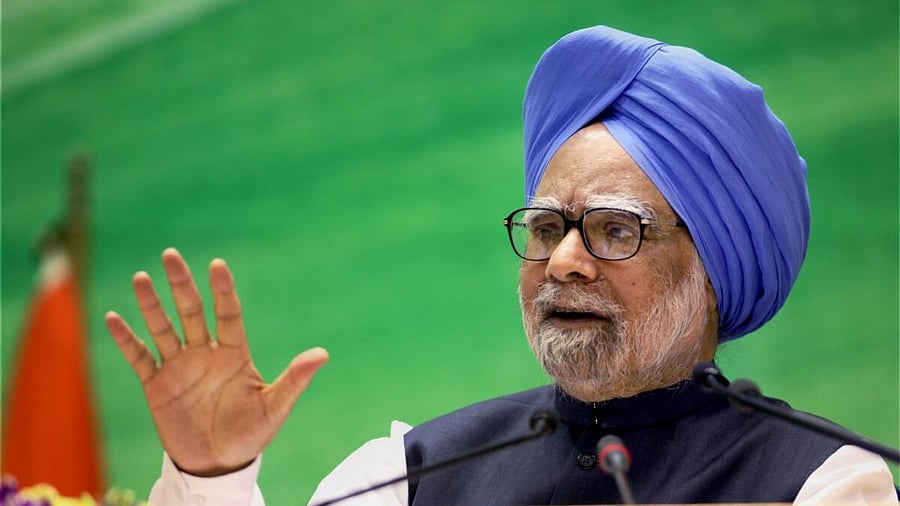
Manmohan Singh
Credit: PTI Photo
In July 1991, as India stood on the precipice of economic collapse, a soft-spoken man with a quiet resolve stepped up to the podium in Parliament and declared: "India is now wide awake. We shall prevail. We shall overcome".
Those words marked not just the beginning of economic liberalisation but the rise of one of the most transformative figures in India's modern history: Manmohan Singh. His life was a testament to resilience, intellect, and an unwavering belief in the power of reform.
As the world bids him farewell, we reflect on his indelible legacy. Singh was not a leader of grand oratory; his strength lay in the weight of his deeds.
As the architect of India’s 1991 economic reforms, he redefined the trajectory of a nation shackled by red tape and protectionism. Liberalisation under his stewardship was not just an economic blueprint: It was a social contract aimed at lifting millions out of poverty, creating opportunities, and steering India towards global integration.
The numbers tell part of the story. Growth rates soared; foreign reserves swelled. But the deeper narrative is one of human transformation. Economic liberalisation meant small entrepreneurs daring to dream, students accessing better education, and families envisioning a more secure future.
Singh's leadership stretched far beyond the realm of finance. His premiership from 2004 to 2014 saw some of the most consequential legislative milestones in independent India’s history.
The Right to Information (RTI) Act empowered citizens to hold the powerful to account, deepening India's democratic roots. The Mahatma Gandhi National Rural Employment Guarantee Act (MNREGA) provided economic stability to rural households. The National Rural Health Mission (NRHM) extended healthcare to those in the margins. The Food Security Act sought to eradicate hunger and ensure dignity for every Indian.
One cannot speak of Singh without mentioning the historic India-US Nuclear Deal — a landmark achievement that ended India's nuclear isolation and ensured long-term energy security. His quiet but firm resolve saw the deal through turbulent political waters, reinforcing the belief that leadership is defined by courage under pressure, not the decibel level of one's voice.
Despite his towering accomplishments, Singh often found himself misunderstood and underestimated. In a political landscape driven by charisma and rhetoric, his silence was derided as weakness.
Yet, history will judge him kindly. His measured, introspective approach ensured stability during some of India's most testing moments — the global financial crisis of 2008, internal security challenges, and coalition
pressures.
Perhaps one of the most defining aspects of Singh's tenure was his relationship with the Congress and its leadership. His and Congress president Sonia Gandhi's synergy reflected a rare balance of power, driven by mutual respect and shared ideals. In an era of political one-upmanship, this division of labour allowed governance to remain focused on progressive, inclusive policies.
Singh's journey was remarkable not only for its achievements but for the humility and integrity he embodied. Born in Gah, a village in present-day Pakistan, he was a child of Partition. That experience instilled in him a sense of resilience and empathy that would shape his public life.
Despite the scars of history, he harboured no bitterness — only a commitment to peace and cooperation. It remains one of history’s ironies that the man who reshaped India's destiny could never visit his birthplace due to strained bilateral relations.
His public-service career began not in the throes of political ambition but through the quiet corridors of academia and governance. From his tenure as chief economic advisor to his role as finance minister, and later as prime minister, Singh carried the gravitas of a scholar and the precision of a technocrat.
His proximity to leaders like Indira Gandhi, Rajiv Gandhi, and P V Narasimha Rao enriched his understanding of governance, while his background in the Planning Commission shaped his economic vision.
Yet, politics was not always kind to him. In 1999, Singh faced a rare electoral defeat in South Delhi. Critics pointed to his economic policies as a reason for the Congress' performance dip, but Sonia Gandhi's unwavering faith in him ensured he remained at the forefront of the party’s leadership. His resilience through these skirmishes highlighted a man who placed duty above personal ambition.
On a personal note, Singh’s warmth and humility left an indelible mark on all who had the privilege of knowing him. His office exuded an air of grace, and his consideration for others transcended protocol. When I had the opportunity to share an early draft of my book — "The Essential" — with him, his failing health did not diminish his generosity.
His inability to read the text did not stop him from extending his blessings and encouragement — a gesture that spoke volumes of the man he was.
Singh's farewell address in 2014, following the Congress' electoral defeat, captured the essence of his life’s work: "I owe everything to this country, this great land of ours where I, an underprivileged child of Partition, was empowered enough to rise and occupy high office. It is a debt that I will never be able to repay."
These words reflect the quiet grace of a man who saw leadership not as a privilege, but as a solemn responsibility.
Even after stepping down as prime minister, Singh continued to serve India as a Member of Parliament. His retirement from the Rajya Sabha in April 2024 marked the end of a 33-year-long parliamentary career. His absence leaves a void not just in the Congress but in the moral fabric of Indian politics.
As we mourn Singh's passing, we find solace in the enduring legacy he leaves behind — a legacy of integrity, humility, and transformative leadership. His vision and policies will continue to guide India in the years to come. Adieu, Dr Singh. Rest in peace. Your silence has always spoken louder than words, and your contributions will forever illuminate India's path.
(The writer is an author, policy analyst and columnist. He serves as the policy officer of the Congress.)